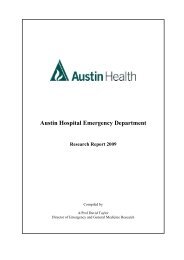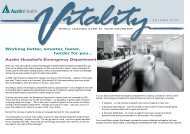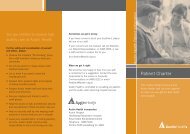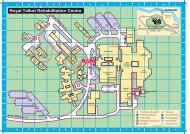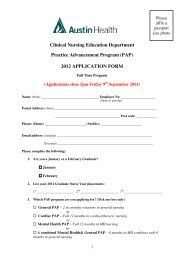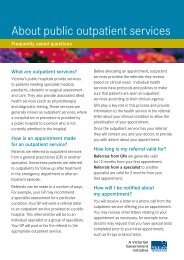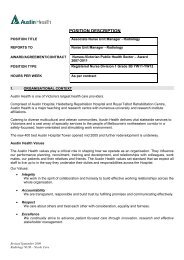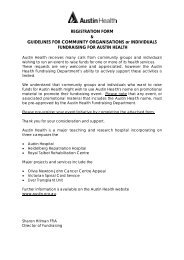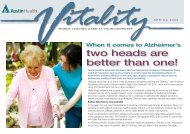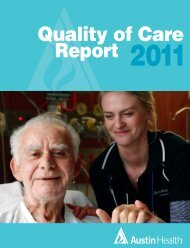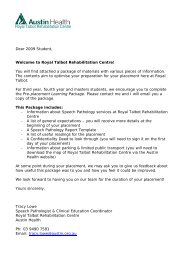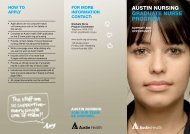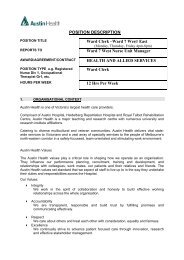Annual Report 2008-09 - Austin Health
Annual Report 2008-09 - Austin Health
Annual Report 2008-09 - Austin Health
You also want an ePaper? Increase the reach of your titles
YUMPU automatically turns print PDFs into web optimized ePapers that Google loves.
LUDWIG INSTITUTE FOR CANCER<br />
RESEARCH AT AUSTIN HEALTH<br />
Prof Andrew Scott, Director of the<br />
Ludwig Institute for Cancer Research<br />
(LICR) at <strong>Austin</strong> Hospital led a team<br />
responsible for the development of a<br />
new paradigm in targeting cancer cells,<br />
the monoclonal antibody (mAb) 806.<br />
Preclinical investigations and a phase<br />
one, first-in-man trial at <strong>Austin</strong> Hospital<br />
in 2007, determined that mAb806 binds<br />
to a previously unreported epitope of<br />
the Epidermal Growth Factor Receptor<br />
(EGFR) that is only exposed in overexpressed,<br />
mutated or amplified EGFR.<br />
Over-expression of EGFR occurs in<br />
more than 50 per cent of some types of<br />
cancers. Current therapies that target<br />
EGFR cause side-effects by targeting<br />
EGFR both when it is over-expressed on<br />
cancer cells and when it is present in<br />
usual amounts on normal cells.<br />
Unlike these reagents, mAb806 has been<br />
shown in pre-clinical testing to have no<br />
cross-reactivity with normal tissue, and<br />
is the first tumour-specific antibody<br />
directed towards a cancer-related<br />
growth factor receptor.<br />
In November one of the LICR<br />
spin-off companies, Life Science<br />
Pharmaceuticals, licensed mAb806 to<br />
pharmaceutical company Abbott. LICR<br />
at <strong>Austin</strong> <strong>Health</strong> continues to be actively<br />
involved with Abbott in the ongoing<br />
clinical development of this exciting<br />
cancer therapy candidate.<br />
NHMRC EXCELLENCE AWARDS <strong>2008</strong><br />
Reinforcing <strong>Austin</strong> <strong>Health</strong>’s national<br />
importance as a research precinct,<br />
two of its researchers were recognised<br />
with prestigious NHMRC Excellence<br />
Awards, only given to the seven<br />
highest-ranking grant and fellowship<br />
recipients in Australia.<br />
Neurologist Prof Graeme Jackson,<br />
Director and founder of the Brain<br />
Research Institute was recognised<br />
for his work defining the causes of<br />
epilepsy and classifying the brain’s<br />
developmental abnormalities using<br />
magnetic resonance imaging.<br />
Dr Sofianos Andrikopoulos, head of<br />
the Islet Biology Research Group at The<br />
University of Melbourne Department<br />
of Medicine at <strong>Austin</strong> <strong>Health</strong>, was<br />
recognised for research that suggested<br />
that a common class of drugs used to<br />
treat type 2 diabetes, sulfonylureas,<br />
actually accelerate the disease.<br />
AUSTIN LIFESCIENCES<br />
RESEARCH WEEK<br />
Researchers from <strong>Austin</strong> <strong>Health</strong> and its<br />
associated institutions and universities<br />
participated in the annual Research<br />
Week celebrations in October. The <strong>Austin</strong><br />
LifeSciences Symposium and plenary<br />
session were popular events, and 153<br />
researchers displayed their work in the<br />
annual poster competition.<br />
Numerous awards were given for<br />
excellence in various fields of research,<br />
including allied health, cancer, stroke,<br />
nursing, parent/infant, clinical and<br />
general research. The <strong>2008</strong> Distinguished<br />
Scientist Award was presented to<br />
endocrinologist and internationallyrecognised<br />
expert on osteoporosis<br />
Prof Ego Seeman for his contribution to<br />
the <strong>Austin</strong> research community over his<br />
career at <strong>Austin</strong> <strong>Health</strong>.<br />
Rising talent Dr Cherie Chiang won both<br />
awards open to young researchers – the<br />
<strong>Austin</strong> Lifesciences Award for Basic<br />
Research and the Young Investigator<br />
Award, for her abstract Mineralisation<br />
and Bone Resorption are Regulated by<br />
the Androgen Receptor in Male Mice.<br />
NATIONAL HEALTH AND<br />
MEDICAL RESEARCH COUNCIL<br />
GRANT WINNERS 20<strong>09</strong><br />
Prof L Burrell: Vasopressin and<br />
heart failure, $551,250<br />
Prof E Seeman, Dr R Zebaze and<br />
team: Cortical porosity to bone<br />
fragility, $596,250<br />
Prof J Proietto: Understanding how<br />
obesity and abnormal lipids are<br />
linked, $320,100<br />
Prof G Jerums, Assoc Prof R<br />
MacIsaac and team: eGFR in<br />
indigenous Australians, $926,200<br />
Prof J Zajac, Dr R Davey and team:<br />
Male hormone receptors in boneforming<br />
cells, $451,625<br />
Dr S Andrikopoulos, Dr B Fam and<br />
team: The role of a liver enzyme in<br />
controlling body weight, $475,125<br />
Assoc Prof I Davis, Prof J Cebon,<br />
Assoc Prof W Chen and team:<br />
Immune targeting of melanoma<br />
stem cells, $506,250<br />
Prof A Scott, Dr P Ramsland and<br />
team: Using the immune system to<br />
treat cancers, $543,500<br />
Prof D Power: Waste control in<br />
kidney disease, $438,000<br />
Dr D Christiansen, Dr P Ramsland,<br />
Dr H Vaughan, Prof M Sandrin and<br />
team: The role of carbohydrates in<br />
transplantation, $541,500<br />
Prof R Bellomo and team:<br />
Erythropoietin in Traumatic Brain<br />
Injury (EPO-TBI), $1,848,475<br />
<strong>Austin</strong> <strong>Health</strong> : <strong>2008</strong>-<strong>09</strong> ANNUAL REPORT<br />
27



